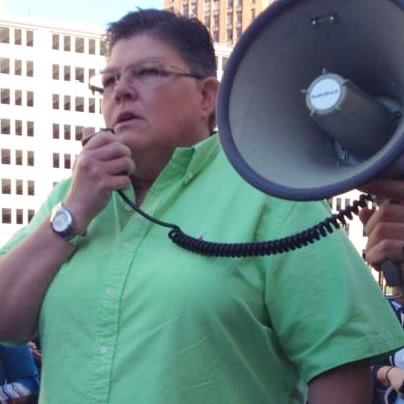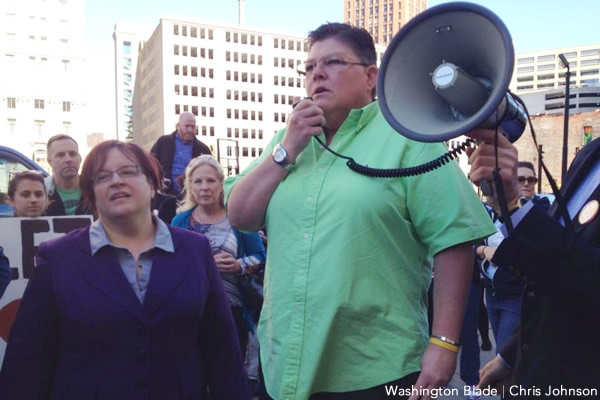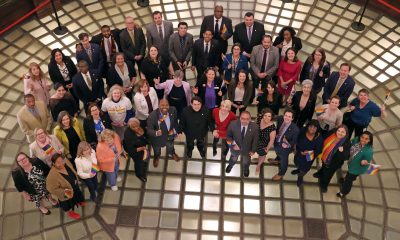News
Court strikes down Michigan marriage ban
Judge delivers ruling following two-week trial on prohibition of gay nuptials


April DeBoer (on left) and Jayne Rowse filed the lawsuit against Michigan’s ban on same-sex marriage (Washington Blade file photo by Chris Johnson).
A federal court in Michigan made the latest in a series of rulings in favor of marriage equality by striking down the Wolverine State’s constitutional ban on same-sex marriage.
In a 31-page ruling, U.S. District Judge Bernard Friedman, a Reagan appointee, ruled on Friday the state’s prohibition on gay nuptials violated the equal protection clause under the Fourteenth Amendment of the U.S. Constitution.
“After reviewing the evidence presented at the trial, including the testimony of various expert witnesses, the exhibits, and stipulations, and after considering all of the legal issues involved, the Court concludes that the MMA is unconstitutional and will enjoin its enforcement,” Friedman writes.
Michigan’s ban on same-sex marriage, known as Michigan Proposal 04-2, was approved as part of the state constitution by 59 percent of Michigan voters in 2004.
Friedman devotes a considerable portion of his decision to the ban’s impact on same-sex couples and the children they raise, drawing on language used by U.S. Associate Justice Anthony Kennedy in his ruling against the Defense of Marriage Act.
“In attempting to define this case as a challenge to ‘the will of the people,’ state defendants lost sight of what this case is truly about: people,” Friedman writes. “No court record of this proceeding could ever fully convey the personal sacrifice of these two plaintiffs who seek to ensure that the state may no longer impair the rights of their children and the thousands of others now being raised by same-sex couples.”
Nowhere does the ruling mention a stay on the decision. Rana Elmire, a spokesperson for the ACLU of Michigan, said her organization believes same-sex couples can marry immediately in the state.
Although Elmire initially said clerks’ offices are reopening to marry couples in the wake of the ruling, the ACLU of Michigan later tweeted that it can’t confirm reports that clerks offices are re-opening
Two of the clerk’s offices for the more populous counties in Michigan — Washtenaw and Oakland — were already closed when the ruling was handed down and had no one answering calls when the Blade contacted them to see if they would reopen. Ingham County Clerk Barb Byrum, was present when the ruling was handed down, but said her office would remain closed until Monday at 8 am.
But according to a tweet from Gongwer News Service, the Washtenaw County clerk’s office will be open at 9 am on Saturday to distribute marriage licenses.
Washtenaw County Clerk to open between 9 a.m. and 1 p.m. Saturday to offer marriage licenses in wake of #gaymarriage ruling.
— Gongwer News Service (@GongwerMichigan) March 22, 2014
Shannon Minter, legal director for the National Center for Lesbian Rights, also said he believes same-sex couples can marry at once in Michigan — as long as clerk’s offices are open.
“I am not sure if any city halls or clerk’s offices are open over the weekend, but if so, then marriages could take place immediately,” Minter said.
Michigan has a three-day waiting period after obtaining a license and being able to wed, but that waiting period can be waived for an additional fee that varies between county to county.
Now that the district has ruled against the state’s ban on same-sex marriage, state officials — Michigan Gov. Rick Snyder and Attorney General Bill Schuette, who have been defending the law in court — have the option to appeal to the decision to the U.S. Sixth Circuit Court of Appeals.
Immediately after the ruling, Schuette filed a notice of appeal with the court, saying he and Snyder “hereby appeal” the case to the appellate court. All four states within the Sixth Circuit — Michigan, Tennessee, Ohio and Kentucky — now have marriage equality cases before the appeals court.
Schuette said in a statement after the ruling that he has filed an emergency request for a stay and an appeal of the decision. Both were filed before the Sixth Circuit late Friday.
“In 2004 the citizens of Michigan recognized that diversity in parenting is best for kids and families because moms and dads are not interchangeable,” Schuette said. “Michigan voters enshrined that decision in our State constitution, and their will should stand and be respected. I will continue to carry out my duty to protect and defend the Constitution.”
The ruling is the latest in a string of decisions from federal courts against bans on same-sex marriage in states such as Utah, Oklahoma, Virginia and Texas following the U.S. Supreme Court’s decision against the Defense of Marriage Act. According to Lambda Legal, the decision is the 14th decision in a row from a court striking down a state ban on same-sex marriage after the DOMA decision.
But the decision in Michigan case is the first of the post-DOMA decisions handed down after a trial.
For two weeks, Friedman heard testimony from trial from various witnesses on the constitutionality of Michigan’s ban on same-sex marriage. Among the witnesses the state presented was Mark Regenrus, the author of a widely discredited study denigrating parenting by same-sex couples.
As Think Progress notes, on the witness stand, Regnerus admitted on the witness that he doesn’t know whether excluding same-sex couples from marriage has any impact on the children they raise.
Friedman criticizes the testimony from Regnerus during the trial, saying the court finds his study “entirely unbelievable and not worthy of serious consideration.”
“Whatever Regnerus may have found in this ‘study,’ he certainly cannot purport to have undertaken a scholarly research effort to compare the outcomes of children raised by same-sex couples with those of children raised by heterosexual couples,” Friedman writes. “It is no wonder that the NFSS has been widely and severely criticized by other scholars, and that Regnerus’s own sociology department at the University of Texas has distanced itself from the NFSS in particular and Dr. Regnerus’s views in general and reaffirmed the aforementioned APA position statement.”
The case, DeBoer v. Snyder, was filed by private attorneys in January 2012 on behalf of April DeBoer and Jayne Rowse, a lesbian couple in Hazel Park, Mich., who were seeking the ability to jointly adopt their three children. The couple amended their case early last year to seek marriage equality in Michigan, while still pursuing their goal of adoption rights.
As recorded by local TV affiliate WXYZ, DeBoer and Rowze embraced each other and their children with joy after one of their attorneys, Dana Nessel, read aloud the ruling to them.
LGBT advocates praised Friedman for striking down the ban on same-sex marriage and said it’s evidence a nationwide ruling in favor of marriage equality is within reach.
Jay Kaplan, a staff attorney for the ACLU of Michigan, said the lawsuit at its core was about “protecting Michigan families.”
“We are thrilled that the court found that there is no reason to deny loving, committed same-sex couples and their families the protections that come with marriage,” Kaplan said. “By doing so, the court has underscored the American value that freedom is for everyone.”
Evan Wolfson, president of Freedom to Marry, said the win for same-sex couples in Michigan comes after opponents couldn’t identify a single reason why they shouldn’t be able to marry.
“Today’s win comes after a full trial — complete with prosecutors and defendants, witness cross-examinations, and testimony from family experts on the well-being of children — which showed that opponents have nothing more than the same bogus claims they have recycled for decades,” Wolfson said. “They were simply unable to provide a single legitimate reason why committed same-sex couples should be excluded from marriage. Michigan, like all of America, is ready for the freedom to marry.”
District of Columbia
Taste of Point returns at critical time for queer students
BIPOC scholar to speak at Room & Board event on May 2

The Point Foundation will kick off May with its annual Taste of Point DC event. The event will be hosted at Room & Board on 14th Street and feature a silent auction, food tastings, a speech from a scholar, and more.
Point’s chief of staff, Kevin Wright, said that at Taste of Point, the scholars are the star of the show.
“People never come to an event to hear Point staff speak, they come to hear from the people most impacted by the program,” he said. “At its core Taste of Point is designed to center and highlight our scholars’ voices and experiences.”
This year, a Point BIPOC Scholar, Katherine Guerrero Rivera will speak at the event.
“It is a great opportunity to highlight the scholars out there on the front lines making impacts in almost every sector and job field,” Wright said.
Wright pointed out that this year especially is a pivotal time for LGBTQ students.
“In 2023, there were 20 states that passed anti-LGBTQ legislation,” he said. “By this point in [2024] we already have more.”
Wright said the impacts of those legislative attacks are far reaching and that Point is continuously monitoring the impact they have on students on the ground.
Last month, The Washington Post reported that states with anti-LGBTQ laws in place saw school hate crimes quadruple. This report came a month after a non-binary student, Nex Bennedict, died after being attacked at school.
“So, we see this as a critical moment to really step up and help students who are facing these challenges on their campus,” Wright said. “Our mission is to continue to empower our scholars to achieve their full academic and leadership potential.”
This year Point awarded nearly 600 LGBTQ students with scholarships. These include the flagship scholarship, community college scholarship and the BIPOC scholarship. When the foundation started in 2002, there were only eight scholarships awarded.
Dr. Harjant Gill is one of those scholars who said the scholarship was pivotal for him. Gill said he spent his undergraduate years creating films and doing activism for the LGBTQ community.
As a result, his academic record wasn’t stellar and although he was admitted into American University’s graduate program he had no clue how he would fund it.
Upon arrival to American he was told to apply for a Point scholarship and the rest was history.
“It ended up being the one thing that kept me going otherwise I would have dropped out,” he said. “Point was incredibly instrumental in my journey to becoming an academic and a professor.”
More than a decade later, Gill serves on the host committee for Taste of Point and is a mentor to young Point scholars. He said that he donates money yearly to Point and that when he is asked what he wants for a gift he will often tell his friends to donate too.
To attend the event on Wednesday, May 2, purchase tickets at the Point website. If you can’t attend this year’s Taste of Point DC event but would like to get involved, you can also donate online.
State Department
State Department releases annual human rights report
Antony Blinken reiterates criticism of Uganda’s Anti-Homosexuality Act

Secretary of State Antony Blinken on Monday once again reiterated his criticism of Uganda’s Anti-Homosexuality Act upon release of the State Department’s annual human rights report.
“This year’s report also captures human rights abuses against members of vulnerable communities,” he told reporters. “In Afghanistan, the Taliban have limited work opportunities for women, shuttered institutions found educating girls, and increasing floggings for women and men accused of, quote, ‘immoral behavior,’ end quote. Uganda passed a draconian and discriminatory Anti-Homosexuality Act, threatening LGBTQI+ individuals with life imprisonment, even death, simply for being with the person they loved.”
Ugandan President Yoweri Museveni last May signed the law, which contains a death penalty provision for “aggravated homosexuality.”
The U.S. subsequently imposed visa restrictions on Ugandan officials and removed the country from a program that allows sub-Saharan African countries to trade duty-free with the U.S. The World Bank Group also announced the suspension of new loans to Uganda.
Uganda’s Constitutional Court earlier this month refused to “nullify the Anti-Homosexuality Act in its totality.” More than a dozen Ugandan LGBTQ activists have appealed the ruling.
Clare Byarugaba of Chapter Four Uganda, a Ugandan LGBTQ rights group, on Monday met with National Security Council Chief-of-Staff Curtis Ried. Jay Gilliam, the senior LGBTQI+ coordinator for the U.S. Agency for International Development, in February traveled to Uganda and met with LGBTQ activists who discussed the Anti-Homosexuality Act’s impact.
“LGBTQI+ activists reported police arrested numerous individuals on the basis of their sexual orientation or gender identity and subjected many to forced anal exams, a medically discredited practice with no evidentiary value that was considered a form of cruel, inhuman, and degrading treatment and could amount to torture,” reads the human rights report.
The report, among other things, also notes Ugandan human rights activists “reported numerous instances of state and non-state actor violence and harassment against LGBTQI+ persons and noted authorities did not adequately investigate the cases.”
Report highlights anti-LGBTQ crackdowns in Ghana, Hungary, Russia
Ghanaian lawmakers on Feb. 28 approved the Promotion of Proper Human Sexual Rights and Ghanaian Family Values Bill. The country’s president, Nana Akufo-Addo, has said he will not sign the measure until the Ghanaian Supreme Court rules on whether it is constitutional or not.
The human rights report notes “laws criminalizing consensual same-sex sexual conduct between adults” and “crimes involving violence or threats of violence targeting lesbian, gay, bisexual, transgender, queer or intersex persons” are among the “significant human rights issues” in Ghana.
The report documents Hungarian Prime Minister Viktor Orbán and members of his right-wing Fidesz party’s continued rhetoric against “gender ideology.” It also notes Russia’s ongoing crackdown against LGBTQ people that includes reports of “state actors committed violence against LGBTQI+ individuals based on their sexual orientation or gender identity, particularly in Chechnya.”
The report specifically notes Russian President Vladimir Putin on July 24 signed a law that bans “legal gender recognition, medical interventions aimed at changing the sex of a person, and gender-affirming care.” It also points out Papua New Guinea is among the countries in which consensual same-sex sexual relations remain criminalized.

The Cook Islands and Mauritius in decriminalized homosexuality in 2023.
The report notes the Namibia Supreme Court last May ruled the country must recognize same-sex marriages legally performed outside the country. The report also highlights the Indian Supreme Court’s ruling against marriage equality that it issued last October. (It later announced it would consider an appeal of the decision.)
Congress requires the State Department to release a human rights report each year.
The Biden-Harris administration in 2021 released a memorandum that committed the U.S. to promoting LGBTQ+ and intersex rights abroad.
The full report can be read here.

Dominica’s High Court of Justice on Monday struck down provisions of a law that criminalized consensual same-sex sexual relations.
A gay man who remains anonymous in 2019 challenged sections of the country’s Sexual Offenses Act that criminalized anal sex and “gross indecency” with up to 10 years and 12 years in prison respectively. The plaintiff argued the provisions violated his constitutional rights.
The Dominica Equality and Sexual Expression Association and the Eastern Caribbean Alliance for Diversity and Equality, a group that advocates for LGBTQ and intersex rights in the region, in a press release noted the court in its ruling affirmed “the criminalization of consensual same-sex activity between adults is unconstitutional.” The groups added Justice Kimberly Cenac-Phulgence “declared that the laws commonly known as buggery and gross indecency laws, contravenes the constitution of the Commonwealth of Dominica, namely the right to liberty, freedom of expression, and protection of personal privacy.”
“It is long past time that the dignity and dreams of all Dominicans were recognized,” said DESEA Executive Director Sylvester Jno Baptiste in the press release. “We are all God’s children, and he loves us all equally. Laws that treat some Dominicans as less than others, have no place in a just society.”
Dominica is a former British colony that is located between Guadeloupe and Martinique in the Lesser Antilles.
Antigua and Barbuda, St. Kitts and Nevis, Barbados, and Trinidad and Tobago in recent years have decriminalized consensual same-sex sexual relations.
The Inter-American Commission on Human Rights in 2021 issued a decision that said Jamaica must repeal its colonial-era sodomy law. The country’s Supreme Court last year ruled against a gay man who challenged it.
A judge on St. Vincent and the Grenadines’s top court in February dismissed two cases that challenged the country’s sodomy laws.
“Decriminalization helps create an environment where LGBTQ individuals can live openly without fear of persecution, enabling them to access health care, education, and employment without facing discrimination,” said Outright Executive Director Maria Sjödin on Monday in response to the Dominica ruling. “The repeal of these discriminatory laws is a testament to the tireless efforts of activists, advocates, and allies who have long fought for justice and equality. It is a victory for human rights and a significant milestone in the ongoing struggle for LGBTQ rights in the Caribbean.”
-

 South America4 days ago
South America4 days agoDaniel Zamudio murderer’s parole request denied
-

 Maryland4 days ago
Maryland4 days agoMontgomery County police chief discusses arrest of trans student charged with planned school shooting
-

 Commentary5 days ago
Commentary5 days agoWorld ‘isn’t much different today’
-

 Theater4 days ago
Theater4 days ago‘Amm(i)gone’ explores family, queerness, and faith












